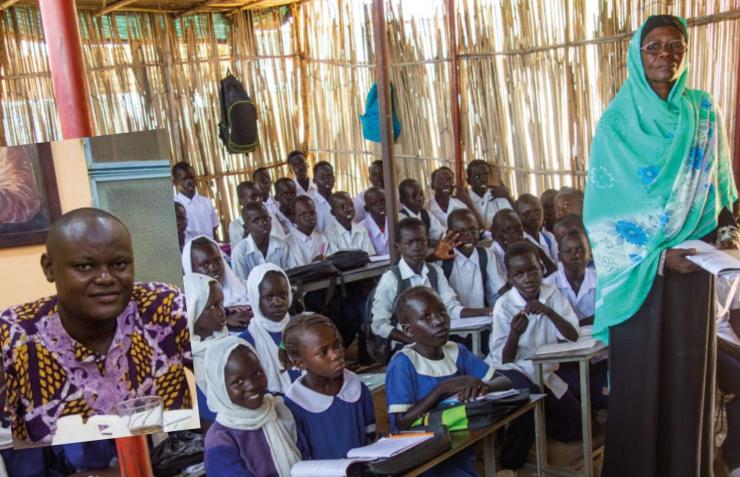Living in a minority context. Prioritize education. The danger of youth gangs. Father Franck Mandozi tells us about it.
I remember very well Saturday 8 September 2018 when I arrived in Kosti, a city 315 kilometres south of Khartoum, the capital of Sudan. I had spent two years studying Arabic in Cairo and after being ordained in 2017 in my home country, the Democratic Republic of the Congo, I was on my way to my first missionary assignment as a priest. Although I was welcomed by four companions, two of them were soon assigned to other missions and we remained the three African priests who now form the Comboni community.
Kosti is a pastoral region of the archdiocese of Khartoum administered by Msgr. Daniel Adwok Kur who, a month after my arrival, made me responsible for liturgical and catechetical pastoral care. I accepted with some hesitation because I had hardly had time to get to know the reality of the area. Since then, I have regularly organized formation meetings in various parishes with both pastoral workers and priests. However, I devote most of my time to accompanying the schools of our parish of St. Paul.
We work in a very difficult context. First of all, due to the heat in this part of the country, where on some days, between March and June, temperatures can reach 50 degrees. But the most difficult thing is living in a totally Islamized environment. Christians represent just 3% of the population and often do not have access to some social benefits.
They are a minority exploited by the current political system which treats Sudanese Christians as second-class citizens just because they are not Muslims. For this reason, they are sometimes deprived of their rights and cannot get promotions at work. This is one of the main reasons why Sudanese Christians are so poor and find it difficult to secure education for their children, many of whom end up in the military or as unclassified policemen.
Most of the people we accompany to our parish, and whose children study in our schools, are South Sudanese. Our neighbours, who are considered refugees here, are doubly marginalized if they are Christians. Some fortunately live as domestic workers in Arab Muslim homes. However, since the arrival of Covid-19, these jobs have decreased due to the economic crisis and inflation.
The reality of the South Sudanese concerns us as a Church. In 2014, Bishop Adwok decided to open the doors of educational centres in the parish of St. Paul, so that the children of South Sudanese and the most disadvantaged families in the area could have access to a good education. Since I arrived, I have monitored these schools, whose classrooms are located in the places of worship of the parish.
We host more than 1,600 students this year. 90% are children of South Sudanese refugees and the remaining 10% come from very poor families of Sudanese nationality. 92% are Christian and 8% Muslim. Of our 85 teachers, 50 are Christians and 35 are Muslims.
The challenges we face are complex. Many families are unable to pay their children’s school fees, even if they are very low. Finding teachers is also a constant problem because we can’t pay them very well and not all of them have the right level of education.
Furthermore, the mobility of people is so great that we can run out of teachers from one day to the next. Another challenge has to do with many of our students whose parents were killed in the fighting in South Sudan. It’s not easy to take care of these children. From the school, we try to look after them and create a serene environment around them that allows them to socialize and adapt to the situation.
In and around Kosti we are experiencing another situation that worries us a lot. We are talking about the emergence of the so-called negas (gangs), which have become a great danger to the population. These are South Sudanese boys and girls aged between 13 and 35, coming from very poor families, whose parents are often not at home to educate them and send them to school. These kids have no moral values and are very violent. They use knives to attack, injure or kill people for no reason. The challenges are great, but the missionary spirit encourages and moves us to work hard and to hope against all odds.






